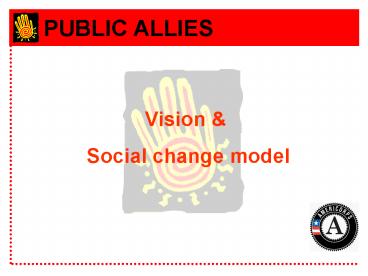PUBLIC ALLIES - PowerPoint PPT Presentation
1 / 6
Title:
PUBLIC ALLIES
Description:
diverse young people into public life. Their vision was that the. energy and idealism of. young people would. transform communities. THE PROBLEM ... – PowerPoint PPT presentation
Number of Views:21
Avg rating:3.0/5.0
Title: PUBLIC ALLIES
1
- PUBLIC ALLIES
Vision Social change model
2
FOUNDING VISION
- With the help of many friends and mentors, two
remarkable young women founded the National
Center for Careers in Public Life (now Public
Allies) in 1992 with 15 Allies in Washington, DC
to create a pipeline for talented and - diverse young people into public life.
- Their vision was that the
- energy and idealism of
- young people would
- transform communities.
3
- THE PROBLEM
At a time when many traditional solutions to
social problems are not working, economic and
social disparities are increasing, and high
profile ethical lapses in all sectors are
compromising the public good, we need new
leaders. The Bridgespan Group reports that the
nonprofit sector will need 640,000 new leaders
over the next decade. Yet developing new leaders
is limited in three ways
The Limits of Current Change Efforts and
Organizations
The Limits of Traditional Leadership Models
The Limited Engagement and Support of Young People
There is a need to address the limitations of
traditional models of leadership in terms
of Who is in leadership roles especially with
regard to diversity and individuals most impacted
by issues How leadership is practiced the
limits of heroic, positional leadership over
values-based, inclusive and collaborative
approaches How leadership is defined and
practiced often influences who will join and lead
efforts
- There is a need to address limitations of how
change is approached in terms of - Collaboration Work is fragmented by single
issues, approaches to change, and organizations
that rarely cross various boundaries - Mobilizing assets There is little community
engagement and there are few pipelines for
emerging community leadership - Leadership Organizational management and
funding interests are not balanced effectively
with broader advocacy and accountability to the
community served
- There is a need to address the limited engagement
and support of diverse young people who - Do not feel represented by and lack trust in
current systems - Desire alternatives to institutions and systems
that do not value or engage their assets,
innovations, and entrepreneurship - Are not aware of how to create viable careers in
nonprofit and public service - Do not receive the training and support needed
when entering the nonprofit workforce, and are
not developed as leaders - Value authenticity in public leadership, but
rarely see it
4
- THE PROBLEM
- The convergence of these factors
- reinforces privilege in who attains and
maintains leadership, - creates few opportunities to develop diverse
young leaders for public life, and - emphasizes leadership practices that result in
the fragmented service of social needs rather
than invigorating public life through increased
innovation, community engagement, and
collaboration
We need to overcome these limits as we prepare
leaders who can innovate in solving public
problems, earn public trust and invigorate the
public life of their communities.
5
SOCIAL CHANGE MODEL
Vision a more just and equitable society for all
- Through our program, Allies gain a framework and
a network to work for change. Allies - build community with a talented and diverse
network of peers working on different issues in
the community. - serve in paid apprenticeships with community
organizations with responsibility for achieving
measurable service results. - receive training, coaching and support to
practice leadership that values collaboration,
inclusion, asset-based community development,
continuous learning, and integrity.
- Communities receive expanded and enhanced
services from nonprofits.
The social change model shows the cause-effect
relationships that lead from our mission to our
vision and identifies our five long-term outcomes.
- 5. Nonprofit, public, and civic organizations are
more diverse, collaborative, and asset-based, and
effectively develop diverse leadership in their
organizations and the community.
Nonprofits have greater capacity through the
Allies service and sharing PAs values and
approach.
1. Young people from diverse backgrounds are seen
as assets in their communities
young adults from diverse and under-represented
backgrounds and a lifetime commitment to working
for positive community and social change join
public allies
- 4. Ally Alumni engage the assets of their
communities so more citizens are engaged in
collective change efforts.
- 2. Ally and Staff alumni join a network of
changemakers social entrepreneurs, servant
leaders, reformers and activists - working both
in influential positions and on the front lines
in communities.
- 3. Ally alumni work together and with others
across issue, approach, sectoral, and cultural
boundaries resulting in innovative approaches and
solutions.
Alumni Programs continue connecting and advancing
the skills, networks, and leadership of the Ally
network. The Leadership Practice trains and
supports other organizations to develop leaders
and leadership values.
Mission advancing diverse young leaders to
strengthen communities, nonprofits, and civic
participation
Action Learning Model (10 months)
Systemic Change Model (10-20 years)
6
- CHANGE
Action Learning Model Public Allies will be the
premier pipeline for developing diverse young
leaders committed to careers working for
community and social change. Systemic Change
Model Thousands of leaders and organizations
working to create a more just and equitable
society will be more effective by practicing
collaboration, diversity and inclusion,
asset-based community development, continuous
learning and integrity.































